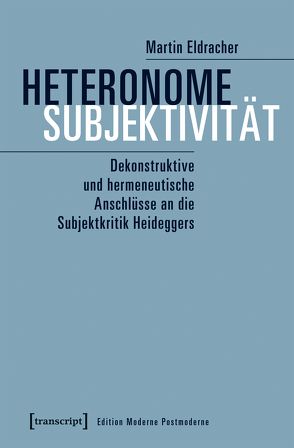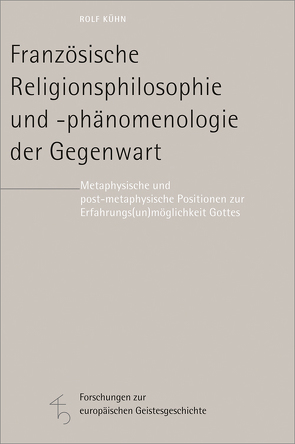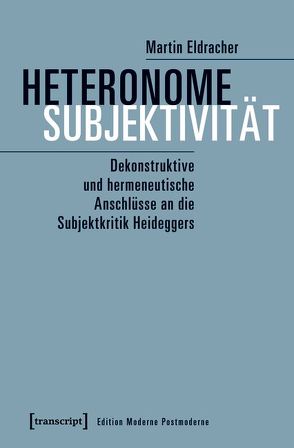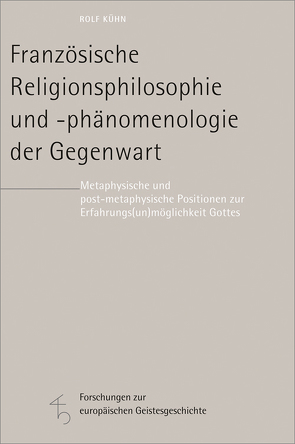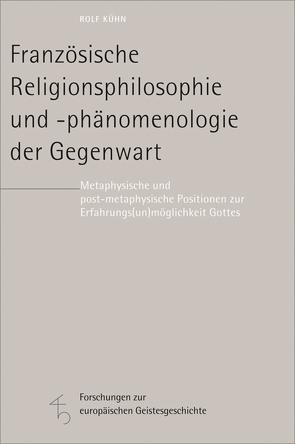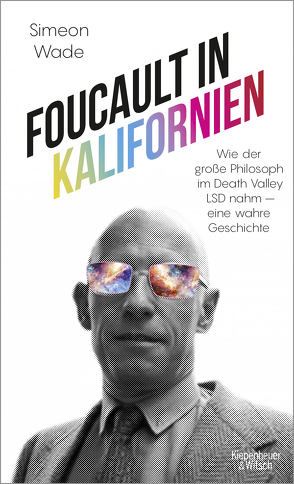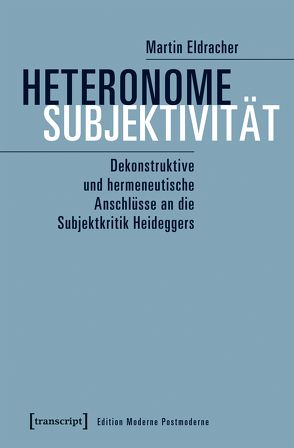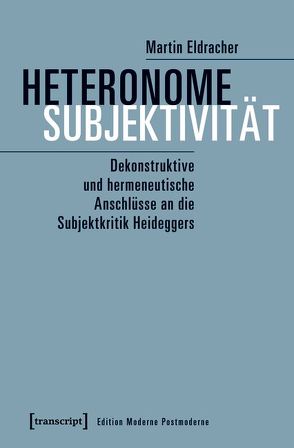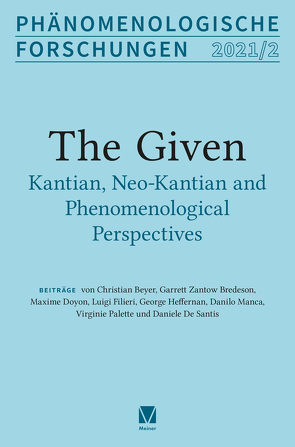
Abstracts
De Santis, Daniele, Manca, Danilo: Introduction. The Given: Historical and Hermeneutical Category or Laziness and Perversion of Reason?
Filieri, Luigi: Sellars and Kant on Givenness and Intuition.
In this paper, I argue that Sellars’s conceptualist reading of Kant, though less radical than more contemporary approaches (e. g., Brandom, McDowell), relies on a controversial account of the relations between the givenness of intuitions, the productive imagination and the power of judgment. I will discuss: 1) how Sellars reconsidered Kant’s account of intuition; and 2) the kind of conceptualism he argues for. I will raise two main claims. First, Sellars’s conceptualist reading of intuition overlooks the role of space and time as givenness conditions. Second, Sellars’s account of the productive imagination disregards the complementary significance of the power of judgment in a priori synthesis, the role of which is to grant synthetic unity. My aim is to reconstruct a consistent dialogue between Sellars and Kant by discussing Sellars’s reading of a priori synthesis and comparing his views to Kant’s original aims.
Bredeson, Garrett Zantow: Natorp’s Critique of Appeals to Givenness in Light of the Marburg Renewal of Idealism.
For Natorp, the most urgent task for turn-of-the-century philosophy consisted in recovering the meaning of idealism. Instead of simply appealing to given facts, idealists transform givennesses of all sorts into tasks for thinking under the guidance of laws which we ourselves have laid down and for which we ourselves are responsible. In this paper I will try to connect the dots between (a) the broader Marburg project of tethering philosophy to the achievements of modern science and (b) Natorp’s critique of his contemporaries’ appeals to givenness. Understanding this connection is, in my view, crucial for appreciating the sense and grounding of Natorp’s idealism.
Palette, Virginie: The Resistance of the Given and its Demythologization in Husserl’s Phenomenology.
The objective of this paper is to reconstruct Husserl’s two-pronged approach of sensory givenness. On the one hand, the phenomenological focus on intentional consciousness implies a virulent criticismof the positivistic myth of the sensory given. On the other hand, there is also a positive appeal to sensory givenness in phenomenology, without which phenomenology would not be worthy of its name and would, ultimately, be nothing other than a form of neo-Kantianism. In the context of transcendental genetic phenomenology, Husserl manages to rehabilitate sensory givenness in a reduced, viz. demythologized form. This reconstruction of Husserl’s ambivalent reference to the given can help phenomenology defend itself against some actual trends, which tend to reduce it to phenomenalismor to conceptualism.
Manca, Danilo: Spontaneity and Givenness. Natorp, Husserl, and Sellars’s Neo-Kantianism.
In this article, I propose a comparison between Natorp, Husserl, and Sellars that has a twofold aim. First, I ask to what extent Sellars’s perspective can be considered to be Neo-Kantian. Second, I demonstrate that the point of divergence among these three thinkers does not have to do with the role they ascribe to givenness in knowledge, but with the way they conceive the activity of thinking. Focusing on Husserl’s reading of Natorp’s theses concerning the subjective and objective ground of knowledge, I show that both Natorp and Husserl agree with Sellars on the limits of a positivistic and empiricist perspective that relies on what is given in perception for the justification of one’s epistemic beliefs. On the other hand, the differences between the three thinkers emerge as soon as we consider how they attempt to integrate the spontaneity of thinking into the sphere of intuition from a renewed Kantian perspective.
De Santis, Daniele: Thought, Being, and the Given in Hans Vaihinger’s Die Philosophie des Als Ob.
The goal of the present paper is to assess Hans Vaihinger’s understanding of the notion of the given in Die Philosophie des Als Ob. The claim will be advanced that the overall framework of Vaihinger’s theory of knowledge and, more specifically, his understanding of both the given and fictions should be sought for in the manner in which R. Hermann Lotze assesses the problem of knowledge, namely, the relation between thought and being in both his early and late Logik. As we will argue, the way in which Vaihinger recasts the opposition between what is given objectively (data of sensations) and what is added subjectively is to be deemed a direct radicalization of Lotze’s own stance. As the conclusion will further add, what is at stake in Vaihinger’s fictionalism is a quite specific understanding of the ideas of reason and transcendental philosophy.
Beyer, Christian: Husserls Verhältnis zu Lotze im Lichte seines Göttinger Seminars über „Lotzes Erkenntnistheorie“.
The present contribution elucidates Husserl’s relationship to Lotze in the light of Winthrop Bell’s notes on Husserl’s 1912 seminar on Lotze’s theory of knowledge. Once again, these notes make it clear that Husserl highly appreciated the chapter on Plato’s theory of ideas from Lotze’s 1874 Logic and his anti-psychologistic view of logic, as far as it goes. However, it also becomes clear that Husserl rejected both Lotze’s account of the origins of objectivity in terms of the doctrine of “achievements of thinking (Denkleistungen)” and the discussion of skepticism in the 1874 Logic against the background of his own (Bolzano-inspired) conception of intentionality and his treatment of the epistemological “problem of transcendence” in the framework of the “phenomenological reduction”.
Hefferman, George: Existential Evidence. The Role of Self-Giving in Husserl’s Phenomenology of Existence.
In this paper, I examine, in five parts, the nature and function of evidence in Husserl’s phenomenology of existence. By “evidence” I understand the intentional achievement of self-giving in Husserl’s sense, and by “phenomenology of existence” I understand the branch of his philosophy that addresses the question concerning a meaningful life. In Part One, I propose that Husserl’s philosophy includes a phenomenology of existence. In Part Two, I employ a selection of texts from Grenzprobleme der Phänomenologie to sketch the basic outlines of his phenomenology of existence. In Part Three, I demonstrate that Husserl develops a concept of evidence rich enough to encompass the evidence appropriate to his phenomenology of existence. In Part Four, I investigate the way in which Husserl appeals to what one may describe as “existential evidence” to ground his manner of apprehending the world as he sees it. In Part Five, I expand the horizon of the investigation by situating “existential evidence” – the “given” that keeps on giving – in the context of other kinds of evidence more familiar to scholars and students of Husserl’s phenomenology.
Doyon, Maxime: La Gestalt d’autrui. Note sur l’étendue de l’influence de la Gestaltpsychologie chez Merleau-Ponty.
The recognition of a meaningful sensory foundation of perception is central to Maurice Merleau-Ponty’s philosophy. If some commentators do not hesitate to see in the notion of perceptual Gestalt a notion applicable to all domains of being, it is not a priori easy to see how it must be conceived in the more specific context of the perception of others (autrui). However, Merleau-Ponty is very clear on this point: all perception manifests itself in the form of a Gestalt, including the perception of other people. The ambition of this short study is to spell out in rough strokes how this injunction should be heard and thus to explain how others manifest themselves as Gestalts to perceptual consciousness.
Aktualisiert: 2023-06-16
> findR *
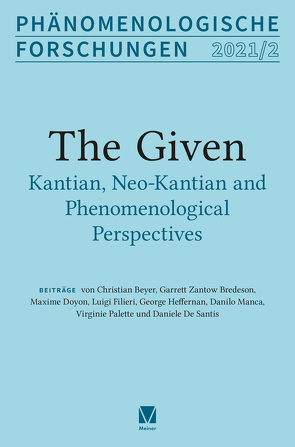
Abstracts
De Santis, Daniele, Manca, Danilo: Introduction. The Given: Historical and Hermeneutical Category or Laziness and Perversion of Reason?
Filieri, Luigi: Sellars and Kant on Givenness and Intuition.
In this paper, I argue that Sellars’s conceptualist reading of Kant, though less radical than more contemporary approaches (e. g., Brandom, McDowell), relies on a controversial account of the relations between the givenness of intuitions, the productive imagination and the power of judgment. I will discuss: 1) how Sellars reconsidered Kant’s account of intuition; and 2) the kind of conceptualism he argues for. I will raise two main claims. First, Sellars’s conceptualist reading of intuition overlooks the role of space and time as givenness conditions. Second, Sellars’s account of the productive imagination disregards the complementary significance of the power of judgment in a priori synthesis, the role of which is to grant synthetic unity. My aim is to reconstruct a consistent dialogue between Sellars and Kant by discussing Sellars’s reading of a priori synthesis and comparing his views to Kant’s original aims.
Bredeson, Garrett Zantow: Natorp’s Critique of Appeals to Givenness in Light of the Marburg Renewal of Idealism.
For Natorp, the most urgent task for turn-of-the-century philosophy consisted in recovering the meaning of idealism. Instead of simply appealing to given facts, idealists transform givennesses of all sorts into tasks for thinking under the guidance of laws which we ourselves have laid down and for which we ourselves are responsible. In this paper I will try to connect the dots between (a) the broader Marburg project of tethering philosophy to the achievements of modern science and (b) Natorp’s critique of his contemporaries’ appeals to givenness. Understanding this connection is, in my view, crucial for appreciating the sense and grounding of Natorp’s idealism.
Palette, Virginie: The Resistance of the Given and its Demythologization in Husserl’s Phenomenology.
The objective of this paper is to reconstruct Husserl’s two-pronged approach of sensory givenness. On the one hand, the phenomenological focus on intentional consciousness implies a virulent criticismof the positivistic myth of the sensory given. On the other hand, there is also a positive appeal to sensory givenness in phenomenology, without which phenomenology would not be worthy of its name and would, ultimately, be nothing other than a form of neo-Kantianism. In the context of transcendental genetic phenomenology, Husserl manages to rehabilitate sensory givenness in a reduced, viz. demythologized form. This reconstruction of Husserl’s ambivalent reference to the given can help phenomenology defend itself against some actual trends, which tend to reduce it to phenomenalismor to conceptualism.
Manca, Danilo: Spontaneity and Givenness. Natorp, Husserl, and Sellars’s Neo-Kantianism.
In this article, I propose a comparison between Natorp, Husserl, and Sellars that has a twofold aim. First, I ask to what extent Sellars’s perspective can be considered to be Neo-Kantian. Second, I demonstrate that the point of divergence among these three thinkers does not have to do with the role they ascribe to givenness in knowledge, but with the way they conceive the activity of thinking. Focusing on Husserl’s reading of Natorp’s theses concerning the subjective and objective ground of knowledge, I show that both Natorp and Husserl agree with Sellars on the limits of a positivistic and empiricist perspective that relies on what is given in perception for the justification of one’s epistemic beliefs. On the other hand, the differences between the three thinkers emerge as soon as we consider how they attempt to integrate the spontaneity of thinking into the sphere of intuition from a renewed Kantian perspective.
De Santis, Daniele: Thought, Being, and the Given in Hans Vaihinger’s Die Philosophie des Als Ob.
The goal of the present paper is to assess Hans Vaihinger’s understanding of the notion of the given in Die Philosophie des Als Ob. The claim will be advanced that the overall framework of Vaihinger’s theory of knowledge and, more specifically, his understanding of both the given and fictions should be sought for in the manner in which R. Hermann Lotze assesses the problem of knowledge, namely, the relation between thought and being in both his early and late Logik. As we will argue, the way in which Vaihinger recasts the opposition between what is given objectively (data of sensations) and what is added subjectively is to be deemed a direct radicalization of Lotze’s own stance. As the conclusion will further add, what is at stake in Vaihinger’s fictionalism is a quite specific understanding of the ideas of reason and transcendental philosophy.
Beyer, Christian: Husserls Verhältnis zu Lotze im Lichte seines Göttinger Seminars über „Lotzes Erkenntnistheorie“.
The present contribution elucidates Husserl’s relationship to Lotze in the light of Winthrop Bell’s notes on Husserl’s 1912 seminar on Lotze’s theory of knowledge. Once again, these notes make it clear that Husserl highly appreciated the chapter on Plato’s theory of ideas from Lotze’s 1874 Logic and his anti-psychologistic view of logic, as far as it goes. However, it also becomes clear that Husserl rejected both Lotze’s account of the origins of objectivity in terms of the doctrine of “achievements of thinking (Denkleistungen)” and the discussion of skepticism in the 1874 Logic against the background of his own (Bolzano-inspired) conception of intentionality and his treatment of the epistemological “problem of transcendence” in the framework of the “phenomenological reduction”.
Hefferman, George: Existential Evidence. The Role of Self-Giving in Husserl’s Phenomenology of Existence.
In this paper, I examine, in five parts, the nature and function of evidence in Husserl’s phenomenology of existence. By “evidence” I understand the intentional achievement of self-giving in Husserl’s sense, and by “phenomenology of existence” I understand the branch of his philosophy that addresses the question concerning a meaningful life. In Part One, I propose that Husserl’s philosophy includes a phenomenology of existence. In Part Two, I employ a selection of texts from Grenzprobleme der Phänomenologie to sketch the basic outlines of his phenomenology of existence. In Part Three, I demonstrate that Husserl develops a concept of evidence rich enough to encompass the evidence appropriate to his phenomenology of existence. In Part Four, I investigate the way in which Husserl appeals to what one may describe as “existential evidence” to ground his manner of apprehending the world as he sees it. In Part Five, I expand the horizon of the investigation by situating “existential evidence” – the “given” that keeps on giving – in the context of other kinds of evidence more familiar to scholars and students of Husserl’s phenomenology.
Doyon, Maxime: La Gestalt d’autrui. Note sur l’étendue de l’influence de la Gestaltpsychologie chez Merleau-Ponty.
The recognition of a meaningful sensory foundation of perception is central to Maurice Merleau-Ponty’s philosophy. If some commentators do not hesitate to see in the notion of perceptual Gestalt a notion applicable to all domains of being, it is not a priori easy to see how it must be conceived in the more specific context of the perception of others (autrui). However, Merleau-Ponty is very clear on this point: all perception manifests itself in the form of a Gestalt, including the perception of other people. The ambition of this short study is to spell out in rough strokes how this injunction should be heard and thus to explain how others manifest themselves as Gestalts to perceptual consciousness.
Aktualisiert: 2023-06-16
> findR *

Dieser Essay stellt sich den grundlegendsten Fragen der Philosophie: der Frage nach dem Ursprung des Seins überhaupt, vor allem aber der Frage nach der Entstehung des Endlichen, weshalb wir dieses für unsere »Natur« halten und wie wir diesen Glauben aufbrechen können.
Jean-Michel Le Lannou ist in seinen früheren Werken durch die Beschäftigung mit Praxen wie der Technik, dem Geld, der Willkür, dem Konsum oder auch der abstrakten Kunst hervorgetreten und konnte zeigen, dass eine erodierende Macht der Abstraktion das menschliche Handeln und Denken fundamental strukturiert. In seinem neuen Text befragt er nun direkt das Wesen dieser Macht, um eine auf sie bezogene Ontologie zu entwickeln. Dabei wird ein radikaler, in der Tradition des Neuplatonismus stehender Idealismus entfaltet, der nicht nur Resultat der Konfrontation mit »modernen« Phänomenen wie Geld oder Konsum ist, sondern sich auch an der Geschichte der Philosophie bis in die Gegenwart hinein abarbeitet. Es ist, so Le Lannou, mitnichten unzeitgemäß, im und durch das Denken nach Freiheit zu streben. Deshalb ist dieses Werk auch nicht bloß eine theoretische Abhandlung über Freiheit, sondern es beansprucht zugleich, die Praxis der Befreiung selbst zu vollziehen.
Aktualisiert: 2023-06-14
> findR *

Dieser Essay stellt sich den grundlegendsten Fragen der Philosophie: der Frage nach dem Ursprung des Seins überhaupt, vor allem aber der Frage nach der Entstehung des Endlichen, weshalb wir dieses für unsere »Natur« halten und wie wir diesen Glauben aufbrechen können.
Jean-Michel Le Lannou ist in seinen früheren Werken durch die Beschäftigung mit Praxen wie der Technik, dem Geld, der Willkür, dem Konsum oder auch der abstrakten Kunst hervorgetreten und konnte zeigen, dass eine erodierende Macht der Abstraktion das menschliche Handeln und Denken fundamental strukturiert. In seinem neuen Text befragt er nun direkt das Wesen dieser Macht, um eine auf sie bezogene Ontologie zu entwickeln. Dabei wird ein radikaler, in der Tradition des Neuplatonismus stehender Idealismus entfaltet, der nicht nur Resultat der Konfrontation mit »modernen« Phänomenen wie Geld oder Konsum ist, sondern sich auch an der Geschichte der Philosophie bis in die Gegenwart hinein abarbeitet. Es ist, so Le Lannou, mitnichten unzeitgemäß, im und durch das Denken nach Freiheit zu streben. Deshalb ist dieses Werk auch nicht bloß eine theoretische Abhandlung über Freiheit, sondern es beansprucht zugleich, die Praxis der Befreiung selbst zu vollziehen.
Aktualisiert: 2023-06-14
> findR *

Dieser Essay stellt sich den grundlegendsten Fragen der Philosophie: der Frage nach dem Ursprung des Seins überhaupt, vor allem aber der Frage nach der Entstehung des Endlichen, weshalb wir dieses für unsere »Natur« halten und wie wir diesen Glauben aufbrechen können.
Jean-Michel Le Lannou ist in seinen früheren Werken durch die Beschäftigung mit Praxen wie der Technik, dem Geld, der Willkür, dem Konsum oder auch der abstrakten Kunst hervorgetreten und konnte zeigen, dass eine erodierende Macht der Abstraktion das menschliche Handeln und Denken fundamental strukturiert. In seinem neuen Text befragt er nun direkt das Wesen dieser Macht, um eine auf sie bezogene Ontologie zu entwickeln. Dabei wird ein radikaler, in der Tradition des Neuplatonismus stehender Idealismus entfaltet, der nicht nur Resultat der Konfrontation mit »modernen« Phänomenen wie Geld oder Konsum ist, sondern sich auch an der Geschichte der Philosophie bis in die Gegenwart hinein abarbeitet. Es ist, so Le Lannou, mitnichten unzeitgemäß, im und durch das Denken nach Freiheit zu streben. Deshalb ist dieses Werk auch nicht bloß eine theoretische Abhandlung über Freiheit, sondern es beansprucht zugleich, die Praxis der Befreiung selbst zu vollziehen.
Aktualisiert: 2023-06-14
> findR *
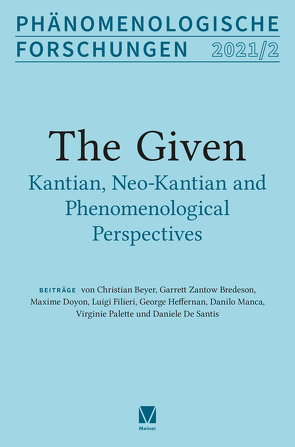
Abstracts
De Santis, Daniele, Manca, Danilo: Introduction. The Given: Historical and Hermeneutical Category or Laziness and Perversion of Reason?
Filieri, Luigi: Sellars and Kant on Givenness and Intuition.
In this paper, I argue that Sellars’s conceptualist reading of Kant, though less radical than more contemporary approaches (e. g., Brandom, McDowell), relies on a controversial account of the relations between the givenness of intuitions, the productive imagination and the power of judgment. I will discuss: 1) how Sellars reconsidered Kant’s account of intuition; and 2) the kind of conceptualism he argues for. I will raise two main claims. First, Sellars’s conceptualist reading of intuition overlooks the role of space and time as givenness conditions. Second, Sellars’s account of the productive imagination disregards the complementary significance of the power of judgment in a priori synthesis, the role of which is to grant synthetic unity. My aim is to reconstruct a consistent dialogue between Sellars and Kant by discussing Sellars’s reading of a priori synthesis and comparing his views to Kant’s original aims.
Bredeson, Garrett Zantow: Natorp’s Critique of Appeals to Givenness in Light of the Marburg Renewal of Idealism.
For Natorp, the most urgent task for turn-of-the-century philosophy consisted in recovering the meaning of idealism. Instead of simply appealing to given facts, idealists transform givennesses of all sorts into tasks for thinking under the guidance of laws which we ourselves have laid down and for which we ourselves are responsible. In this paper I will try to connect the dots between (a) the broader Marburg project of tethering philosophy to the achievements of modern science and (b) Natorp’s critique of his contemporaries’ appeals to givenness. Understanding this connection is, in my view, crucial for appreciating the sense and grounding of Natorp’s idealism.
Palette, Virginie: The Resistance of the Given and its Demythologization in Husserl’s Phenomenology.
The objective of this paper is to reconstruct Husserl’s two-pronged approach of sensory givenness. On the one hand, the phenomenological focus on intentional consciousness implies a virulent criticismof the positivistic myth of the sensory given. On the other hand, there is also a positive appeal to sensory givenness in phenomenology, without which phenomenology would not be worthy of its name and would, ultimately, be nothing other than a form of neo-Kantianism. In the context of transcendental genetic phenomenology, Husserl manages to rehabilitate sensory givenness in a reduced, viz. demythologized form. This reconstruction of Husserl’s ambivalent reference to the given can help phenomenology defend itself against some actual trends, which tend to reduce it to phenomenalismor to conceptualism.
Manca, Danilo: Spontaneity and Givenness. Natorp, Husserl, and Sellars’s Neo-Kantianism.
In this article, I propose a comparison between Natorp, Husserl, and Sellars that has a twofold aim. First, I ask to what extent Sellars’s perspective can be considered to be Neo-Kantian. Second, I demonstrate that the point of divergence among these three thinkers does not have to do with the role they ascribe to givenness in knowledge, but with the way they conceive the activity of thinking. Focusing on Husserl’s reading of Natorp’s theses concerning the subjective and objective ground of knowledge, I show that both Natorp and Husserl agree with Sellars on the limits of a positivistic and empiricist perspective that relies on what is given in perception for the justification of one’s epistemic beliefs. On the other hand, the differences between the three thinkers emerge as soon as we consider how they attempt to integrate the spontaneity of thinking into the sphere of intuition from a renewed Kantian perspective.
De Santis, Daniele: Thought, Being, and the Given in Hans Vaihinger’s Die Philosophie des Als Ob.
The goal of the present paper is to assess Hans Vaihinger’s understanding of the notion of the given in Die Philosophie des Als Ob. The claim will be advanced that the overall framework of Vaihinger’s theory of knowledge and, more specifically, his understanding of both the given and fictions should be sought for in the manner in which R. Hermann Lotze assesses the problem of knowledge, namely, the relation between thought and being in both his early and late Logik. As we will argue, the way in which Vaihinger recasts the opposition between what is given objectively (data of sensations) and what is added subjectively is to be deemed a direct radicalization of Lotze’s own stance. As the conclusion will further add, what is at stake in Vaihinger’s fictionalism is a quite specific understanding of the ideas of reason and transcendental philosophy.
Beyer, Christian: Husserls Verhältnis zu Lotze im Lichte seines Göttinger Seminars über „Lotzes Erkenntnistheorie“.
The present contribution elucidates Husserl’s relationship to Lotze in the light of Winthrop Bell’s notes on Husserl’s 1912 seminar on Lotze’s theory of knowledge. Once again, these notes make it clear that Husserl highly appreciated the chapter on Plato’s theory of ideas from Lotze’s 1874 Logic and his anti-psychologistic view of logic, as far as it goes. However, it also becomes clear that Husserl rejected both Lotze’s account of the origins of objectivity in terms of the doctrine of “achievements of thinking (Denkleistungen)” and the discussion of skepticism in the 1874 Logic against the background of his own (Bolzano-inspired) conception of intentionality and his treatment of the epistemological “problem of transcendence” in the framework of the “phenomenological reduction”.
Hefferman, George: Existential Evidence. The Role of Self-Giving in Husserl’s Phenomenology of Existence.
In this paper, I examine, in five parts, the nature and function of evidence in Husserl’s phenomenology of existence. By “evidence” I understand the intentional achievement of self-giving in Husserl’s sense, and by “phenomenology of existence” I understand the branch of his philosophy that addresses the question concerning a meaningful life. In Part One, I propose that Husserl’s philosophy includes a phenomenology of existence. In Part Two, I employ a selection of texts from Grenzprobleme der Phänomenologie to sketch the basic outlines of his phenomenology of existence. In Part Three, I demonstrate that Husserl develops a concept of evidence rich enough to encompass the evidence appropriate to his phenomenology of existence. In Part Four, I investigate the way in which Husserl appeals to what one may describe as “existential evidence” to ground his manner of apprehending the world as he sees it. In Part Five, I expand the horizon of the investigation by situating “existential evidence” – the “given” that keeps on giving – in the context of other kinds of evidence more familiar to scholars and students of Husserl’s phenomenology.
Doyon, Maxime: La Gestalt d’autrui. Note sur l’étendue de l’influence de la Gestaltpsychologie chez Merleau-Ponty.
The recognition of a meaningful sensory foundation of perception is central to Maurice Merleau-Ponty’s philosophy. If some commentators do not hesitate to see in the notion of perceptual Gestalt a notion applicable to all domains of being, it is not a priori easy to see how it must be conceived in the more specific context of the perception of others (autrui). However, Merleau-Ponty is very clear on this point: all perception manifests itself in the form of a Gestalt, including the perception of other people. The ambition of this short study is to spell out in rough strokes how this injunction should be heard and thus to explain how others manifest themselves as Gestalts to perceptual consciousness.
Aktualisiert: 2023-06-14
> findR *

Abstracts
De Santis, Daniele, Manca, Danilo: Introduction. The Given: Historical and Hermeneutical Category or Laziness and Perversion of Reason?
Filieri, Luigi: Sellars and Kant on Givenness and Intuition.
In this paper, I argue that Sellars’s conceptualist reading of Kant, though less radical than more contemporary approaches (e. g., Brandom, McDowell), relies on a controversial account of the relations between the givenness of intuitions, the productive imagination and the power of judgment. I will discuss: 1) how Sellars reconsidered Kant’s account of intuition; and 2) the kind of conceptualism he argues for. I will raise two main claims. First, Sellars’s conceptualist reading of intuition overlooks the role of space and time as givenness conditions. Second, Sellars’s account of the productive imagination disregards the complementary significance of the power of judgment in a priori synthesis, the role of which is to grant synthetic unity. My aim is to reconstruct a consistent dialogue between Sellars and Kant by discussing Sellars’s reading of a priori synthesis and comparing his views to Kant’s original aims.
Bredeson, Garrett Zantow: Natorp’s Critique of Appeals to Givenness in Light of the Marburg Renewal of Idealism.
For Natorp, the most urgent task for turn-of-the-century philosophy consisted in recovering the meaning of idealism. Instead of simply appealing to given facts, idealists transform givennesses of all sorts into tasks for thinking under the guidance of laws which we ourselves have laid down and for which we ourselves are responsible. In this paper I will try to connect the dots between (a) the broader Marburg project of tethering philosophy to the achievements of modern science and (b) Natorp’s critique of his contemporaries’ appeals to givenness. Understanding this connection is, in my view, crucial for appreciating the sense and grounding of Natorp’s idealism.
Palette, Virginie: The Resistance of the Given and its Demythologization in Husserl’s Phenomenology.
The objective of this paper is to reconstruct Husserl’s two-pronged approach of sensory givenness. On the one hand, the phenomenological focus on intentional consciousness implies a virulent criticismof the positivistic myth of the sensory given. On the other hand, there is also a positive appeal to sensory givenness in phenomenology, without which phenomenology would not be worthy of its name and would, ultimately, be nothing other than a form of neo-Kantianism. In the context of transcendental genetic phenomenology, Husserl manages to rehabilitate sensory givenness in a reduced, viz. demythologized form. This reconstruction of Husserl’s ambivalent reference to the given can help phenomenology defend itself against some actual trends, which tend to reduce it to phenomenalismor to conceptualism.
Manca, Danilo: Spontaneity and Givenness. Natorp, Husserl, and Sellars’s Neo-Kantianism.
In this article, I propose a comparison between Natorp, Husserl, and Sellars that has a twofold aim. First, I ask to what extent Sellars’s perspective can be considered to be Neo-Kantian. Second, I demonstrate that the point of divergence among these three thinkers does not have to do with the role they ascribe to givenness in knowledge, but with the way they conceive the activity of thinking. Focusing on Husserl’s reading of Natorp’s theses concerning the subjective and objective ground of knowledge, I show that both Natorp and Husserl agree with Sellars on the limits of a positivistic and empiricist perspective that relies on what is given in perception for the justification of one’s epistemic beliefs. On the other hand, the differences between the three thinkers emerge as soon as we consider how they attempt to integrate the spontaneity of thinking into the sphere of intuition from a renewed Kantian perspective.
De Santis, Daniele: Thought, Being, and the Given in Hans Vaihinger’s Die Philosophie des Als Ob.
The goal of the present paper is to assess Hans Vaihinger’s understanding of the notion of the given in Die Philosophie des Als Ob. The claim will be advanced that the overall framework of Vaihinger’s theory of knowledge and, more specifically, his understanding of both the given and fictions should be sought for in the manner in which R. Hermann Lotze assesses the problem of knowledge, namely, the relation between thought and being in both his early and late Logik. As we will argue, the way in which Vaihinger recasts the opposition between what is given objectively (data of sensations) and what is added subjectively is to be deemed a direct radicalization of Lotze’s own stance. As the conclusion will further add, what is at stake in Vaihinger’s fictionalism is a quite specific understanding of the ideas of reason and transcendental philosophy.
Beyer, Christian: Husserls Verhältnis zu Lotze im Lichte seines Göttinger Seminars über „Lotzes Erkenntnistheorie“.
The present contribution elucidates Husserl’s relationship to Lotze in the light of Winthrop Bell’s notes on Husserl’s 1912 seminar on Lotze’s theory of knowledge. Once again, these notes make it clear that Husserl highly appreciated the chapter on Plato’s theory of ideas from Lotze’s 1874 Logic and his anti-psychologistic view of logic, as far as it goes. However, it also becomes clear that Husserl rejected both Lotze’s account of the origins of objectivity in terms of the doctrine of “achievements of thinking (Denkleistungen)” and the discussion of skepticism in the 1874 Logic against the background of his own (Bolzano-inspired) conception of intentionality and his treatment of the epistemological “problem of transcendence” in the framework of the “phenomenological reduction”.
Hefferman, George: Existential Evidence. The Role of Self-Giving in Husserl’s Phenomenology of Existence.
In this paper, I examine, in five parts, the nature and function of evidence in Husserl’s phenomenology of existence. By “evidence” I understand the intentional achievement of self-giving in Husserl’s sense, and by “phenomenology of existence” I understand the branch of his philosophy that addresses the question concerning a meaningful life. In Part One, I propose that Husserl’s philosophy includes a phenomenology of existence. In Part Two, I employ a selection of texts from Grenzprobleme der Phänomenologie to sketch the basic outlines of his phenomenology of existence. In Part Three, I demonstrate that Husserl develops a concept of evidence rich enough to encompass the evidence appropriate to his phenomenology of existence. In Part Four, I investigate the way in which Husserl appeals to what one may describe as “existential evidence” to ground his manner of apprehending the world as he sees it. In Part Five, I expand the horizon of the investigation by situating “existential evidence” – the “given” that keeps on giving – in the context of other kinds of evidence more familiar to scholars and students of Husserl’s phenomenology.
Doyon, Maxime: La Gestalt d’autrui. Note sur l’étendue de l’influence de la Gestaltpsychologie chez Merleau-Ponty.
The recognition of a meaningful sensory foundation of perception is central to Maurice Merleau-Ponty’s philosophy. If some commentators do not hesitate to see in the notion of perceptual Gestalt a notion applicable to all domains of being, it is not a priori easy to see how it must be conceived in the more specific context of the perception of others (autrui). However, Merleau-Ponty is very clear on this point: all perception manifests itself in the form of a Gestalt, including the perception of other people. The ambition of this short study is to spell out in rough strokes how this injunction should be heard and thus to explain how others manifest themselves as Gestalts to perceptual consciousness.
Aktualisiert: 2023-06-14
> findR *
Die Kritik am autonomen, über sich verfügenden und sich selbst transparenten Subjekt, wie sie Martin Heidegger am entschiedensten ausgearbeitet hat, führte in der Mitte des 20. Jahrhunderts in der Philosophie zu einer Verabschiedung der Kategorie »Subjektivität«. Die Ironie dieser Situation liegt darin, dass gerade auf dem Boden einer solch umfassenden Kritik die Existenzweise von Subjekten und damit die Möglichkeit der Freiheit neu ausgelegt werden können.
Martin Eldrachers Studie zeigt, wie sich erst im Anschluss an die Freilegung einer anarchischen Abhängigkeit Handlungsfähigkeit, Verantwortung und Selbstverständnis als zentrale Komponenten von Subjektivität überzeugend denken lassen.
Aktualisiert: 2023-06-09
> findR *
Kühn, international renommierter Kenner der französischen Philosophie, gibt einen Überblick über die Entwicklung der Religionsphilosophie in Frankreich vom Rationalismus bis zur Geistesphilosophie und vom Strukturalismus bis zur radikalisierten Phänomenologie. Er stellt die Ansätze prägender französischer Denker in klarer und präziser Weise vor. Behandelt werden etwa Blondel, Bergson, Nabert, Marcel, Merleau-Ponty, Ricœur, Levinas, Derrida, Marion, Henry.
Aktualisiert: 2023-06-08
> findR *
Die Kritik am autonomen, über sich verfügenden und sich selbst transparenten Subjekt, wie sie Martin Heidegger am entschiedensten ausgearbeitet hat, führte in der Mitte des 20. Jahrhunderts in der Philosophie zu einer Verabschiedung der Kategorie »Subjektivität«. Die Ironie dieser Situation liegt darin, dass gerade auf dem Boden einer solch umfassenden Kritik die Existenzweise von Subjekten und damit die Möglichkeit der Freiheit neu ausgelegt werden können.
Martin Eldrachers Studie zeigt, wie sich erst im Anschluss an die Freilegung einer anarchischen Abhängigkeit Handlungsfähigkeit, Verantwortung und Selbstverständnis als zentrale Komponenten von Subjektivität überzeugend denken lassen.
Aktualisiert: 2023-06-09
> findR *
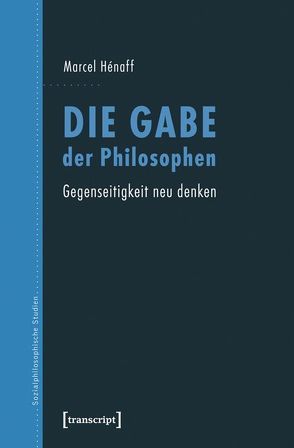
Der philosophische Diskurs um die Gabe erfährt seit geraumer Zeit eine Renaissance. Trotz vieler Unterschiede sind sich Philosophen wie Derrida, Levinas, Ricoeur und andere in einem zentralen Punkt einig: In ihren Augen ist die einzige wirkliche Gabe eine Gabe ohne Erwiderung. Jedwede Gegenseitigkeit scheint ihnen von vornherein mit einem ökonomischen Tausch verbunden zu sein und damit das Wesen der »reinen« Gabe zu verfehlen. Doch können wir die Stiftung des sozialen Bandes gänzlich ohne ein Verhältnis der Gegenseitigkeit denken?
Marcel Hénaff interveniert in diesen Diskurs, indem er zeigt, dass verschiedene Arten der Gabe unterschieden werden müssen. Die wohltätige Gabe und die solidarische Gabe kennen die Forderung nach Gegenseitigkeit nicht. Diese steht jedoch im Mittelpunkt der zeremoniellen Gabe, die in erster Linie eine Entscheidung für das Bündnis ist, eine Geste gegenseitig gewährter öffentlicher Anerkennung, wodurch sich das typisch menschliche soziale Band als politisch erweist.
Aktualisiert: 2023-06-09
> findR *
Kühn, international renommierter Kenner der französischen Philosophie, gibt einen Überblick über die Entwicklung der Religionsphilosophie in Frankreich vom Rationalismus bis zur Geistesphilosophie und vom Strukturalismus bis zur radikalisierten Phänomenologie. Er stellt die Ansätze prägender französischer Denker in klarer und präziser Weise vor. Behandelt werden etwa Blondel, Bergson, Nabert, Marcel, Merleau-Ponty, Ricœur, Levinas, Derrida, Marion, Henry.
Aktualisiert: 2023-06-08
> findR *
Kühn, international renommierter Kenner der französischen Philosophie, gibt einen Überblick über die Entwicklung der Religionsphilosophie in Frankreich vom Rationalismus bis zur Geistesphilosophie und vom Strukturalismus bis zur radikalisierten Phänomenologie. Er stellt die Ansätze prägender französischer Denker in klarer und präziser Weise vor. Behandelt werden etwa Blondel, Bergson, Nabert, Marcel, Merleau-Ponty, Ricœur, Levinas, Derrida, Marion, Henry.
Aktualisiert: 2023-06-08
> findR *

Denken kann gefährlich sein. Aber Sünde? Axel Matthes blickt zurück auf ein Leben mit und für die Literatur und die Philosophie.
»Die Abfallhalde der Literatur wollte ich nie vergrößern, über reichlich Schrott anderswo staunend. Tagesgespräch war schon seit 100, 150 Jahren offenbar alles, was uns heute als drittrangig oder obsolet erscheint. Es stöhnten und protestierten diejenigen, die wir heute wiederentdecken, zu schätzen wissen. Die Motive meines Lebens und des verlegerischen Tuns stimmten zusammen. Sah ins Lebens-Dunkel unverzagt.« Axel Matthes, der Mitgründer und jahrelange Leiter von Rogner & Bernhard und spätere Verleger von Matthes & Seitz, hält in diesem Buch Rückschau auf seine nicht endende Auseinandersetzung mit den großen Fragen der abendländischen Philosophie – nicht nur im Denken, auch in der verlegerischen Praxis. Der Lebensbericht des Entdeckers und Wiederentdeckers von Autoren wie Antonin Artaud, Georges Bataille, Hans Jürgen von der Wense und D. A. F. de Sade mündet in einer Ideen- und Verlagsgeschichte, die mühelos Verknüpfungen schafft zwischen der Antike und heute, zwischen linkem und rechtem Anarchismus, zwischen Blaise Pascal und Coco Chanel – und dabei dennoch nie die Richtung verliert
Aktualisiert: 2023-06-06
> findR *

Denken kann gefährlich sein. Aber Sünde? Axel Matthes blickt zurück auf ein Leben mit und für die Literatur und die Philosophie.
»Die Abfallhalde der Literatur wollte ich nie vergrößern, über reichlich Schrott anderswo staunend. Tagesgespräch war schon seit 100, 150 Jahren offenbar alles, was uns heute als drittrangig oder obsolet erscheint. Es stöhnten und protestierten diejenigen, die wir heute wiederentdecken, zu schätzen wissen. Die Motive meines Lebens und des verlegerischen Tuns stimmten zusammen. Sah ins Lebens-Dunkel unverzagt.« Axel Matthes, der Mitgründer und jahrelange Leiter von Rogner & Bernhard und spätere Verleger von Matthes & Seitz, hält in diesem Buch Rückschau auf seine nicht endende Auseinandersetzung mit den großen Fragen der abendländischen Philosophie – nicht nur im Denken, auch in der verlegerischen Praxis. Der Lebensbericht des Entdeckers und Wiederentdeckers von Autoren wie Antonin Artaud, Georges Bataille, Hans Jürgen von der Wense und D. A. F. de Sade mündet in einer Ideen- und Verlagsgeschichte, die mühelos Verknüpfungen schafft zwischen der Antike und heute, zwischen linkem und rechtem Anarchismus, zwischen Blaise Pascal und Coco Chanel – und dabei dennoch nie die Richtung verliert
Aktualisiert: 2023-06-06
> findR *
Aktualisiert: 2023-06-05
> findR *
Die Kritik am autonomen, über sich verfügenden und sich selbst transparenten Subjekt, wie sie Martin Heidegger am entschiedensten ausgearbeitet hat, führte in der Mitte des 20. Jahrhunderts in der Philosophie zu einer Verabschiedung der Kategorie »Subjektivität«. Die Ironie dieser Situation liegt darin, dass gerade auf dem Boden einer solch umfassenden Kritik die Existenzweise von Subjekten und damit die Möglichkeit der Freiheit neu ausgelegt werden können.
Martin Eldrachers Studie zeigt, wie sich erst im Anschluss an die Freilegung einer anarchischen Abhängigkeit Handlungsfähigkeit, Verantwortung und Selbstverständnis als zentrale Komponenten von Subjektivität überzeugend denken lassen.
Aktualisiert: 2023-06-02
> findR *
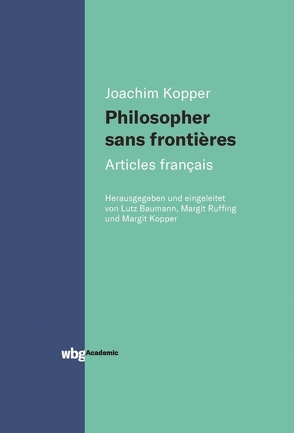
Die Abhandlungen Joachim Koppers (1925-2013) in französischer Sprache sind im Dialog mit französischen zeitgenössischen Denkern und Kollegen in dem Bemühen entstanden, Grundfragen des menschlichen Selbstverständnisses über die Grenzen hinweg zu diskutieren. Im Zentrum seines Forschens stand die Weiterentwicklung der kritischen Philosophie zu einem Denken, das nicht mehr in der Entgegensetzung von Sinnlichkeit und Verstand operiert; menschliche Freiheit und religiöses Verständnis hängen mit dieser Frage unmittelbar zusammen. Seine hier versammelten Aufsätze zur kantischen Philosophie, deren Rezeption in Deutschland und Frankreich, sowie zu eigenständigen französischen und europäischen Denkern zeigen aus verschiedenen Blickrichtungen, wie diese Entgegensetzung, die der Intention nach durch die Kritik der reinen Vernunft überwunden ist, für die kritische Lehre jedoch die Methode abgibt, sich auf das menschliche Dasein und die philosophische Reflexion auswirkt.
Aktualisiert: 2023-06-02
> findR *
Die Kritik am autonomen, über sich verfügenden und sich selbst transparenten Subjekt, wie sie Martin Heidegger am entschiedensten ausgearbeitet hat, führte in der Mitte des 20. Jahrhunderts in der Philosophie zu einer Verabschiedung der Kategorie »Subjektivität«. Die Ironie dieser Situation liegt darin, dass gerade auf dem Boden einer solch umfassenden Kritik die Existenzweise von Subjekten und damit die Möglichkeit der Freiheit neu ausgelegt werden können.
Martin Eldrachers Studie zeigt, wie sich erst im Anschluss an die Freilegung einer anarchischen Abhängigkeit Handlungsfähigkeit, Verantwortung und Selbstverständnis als zentrale Komponenten von Subjektivität überzeugend denken lassen.
Aktualisiert: 2023-06-02
> findR *
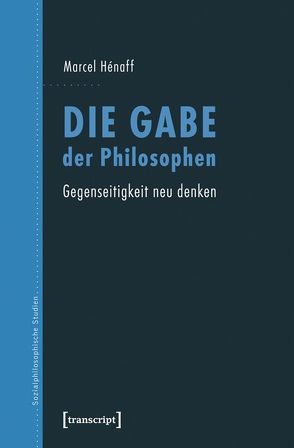
Der philosophische Diskurs um die Gabe erfährt seit geraumer Zeit eine Renaissance. Trotz vieler Unterschiede sind sich Philosophen wie Derrida, Levinas, Ricoeur und andere in einem zentralen Punkt einig: In ihren Augen ist die einzige wirkliche Gabe eine Gabe ohne Erwiderung. Jedwede Gegenseitigkeit scheint ihnen von vornherein mit einem ökonomischen Tausch verbunden zu sein und damit das Wesen der »reinen« Gabe zu verfehlen. Doch können wir die Stiftung des sozialen Bandes gänzlich ohne ein Verhältnis der Gegenseitigkeit denken?
Marcel Hénaff interveniert in diesen Diskurs, indem er zeigt, dass verschiedene Arten der Gabe unterschieden werden müssen. Die wohltätige Gabe und die solidarische Gabe kennen die Forderung nach Gegenseitigkeit nicht. Diese steht jedoch im Mittelpunkt der zeremoniellen Gabe, die in erster Linie eine Entscheidung für das Bündnis ist, eine Geste gegenseitig gewährter öffentlicher Anerkennung, wodurch sich das typisch menschliche soziale Band als politisch erweist.
Aktualisiert: 2023-06-02
> findR *
MEHR ANZEIGEN
Bücher zum Thema französische Philosophie
Sie suchen ein Buch über französische Philosophie? Bei Buch findr finden Sie eine große Auswahl Bücher zum
Thema französische Philosophie. Entdecken Sie neue Bücher oder Klassiker für Sie selbst oder zum Verschenken. Buch findr
hat zahlreiche Bücher zum Thema französische Philosophie im Sortiment. Nehmen Sie sich Zeit zum Stöbern und finden Sie das
passende Buch für Ihr Lesevergnügen. Stöbern Sie durch unser Angebot und finden Sie aus unserer großen Auswahl das
Buch, das Ihnen zusagt. Bei Buch findr finden Sie Romane, Ratgeber, wissenschaftliche und populärwissenschaftliche
Bücher uvm. Bestellen Sie Ihr Buch zum Thema französische Philosophie einfach online und lassen Sie es sich bequem nach
Hause schicken. Wir wünschen Ihnen schöne und entspannte Lesemomente mit Ihrem Buch.
französische Philosophie - Große Auswahl Bücher bei Buch findr
Bei uns finden Sie Bücher beliebter Autoren, Neuerscheinungen, Bestseller genauso wie alte Schätze. Bücher zum
Thema französische Philosophie, die Ihre Fantasie anregen und Bücher, die Sie weiterbilden und Ihnen wissenschaftliche
Fakten vermitteln. Ganz nach Ihrem Geschmack ist das passende Buch für Sie dabei. Finden Sie eine große Auswahl
Bücher verschiedenster Genres, Verlage, Autoren bei Buchfindr:
Sie haben viele Möglichkeiten bei Buch findr die passenden Bücher für Ihr Lesevergnügen zu entdecken. Nutzen Sie
unsere Suchfunktionen, um zu stöbern und für Sie interessante Bücher in den unterschiedlichen Genres und Kategorien
zu finden. Unter französische Philosophie und weitere Themen und Kategorien finden Sie schnell und einfach eine Auflistung
thematisch passender Bücher. Probieren Sie es aus, legen Sie jetzt los! Ihrem Lesevergnügen steht nichts im Wege.
Nutzen Sie die Vorteile Ihre Bücher online zu kaufen und bekommen Sie die bestellten Bücher schnell und bequem
zugestellt. Nehmen Sie sich die Zeit, online die Bücher Ihrer Wahl anzulesen, Buchempfehlungen und Rezensionen zu
studieren, Informationen zu Autoren zu lesen. Viel Spaß beim Lesen wünscht Ihnen das Team von Buchfindr.







